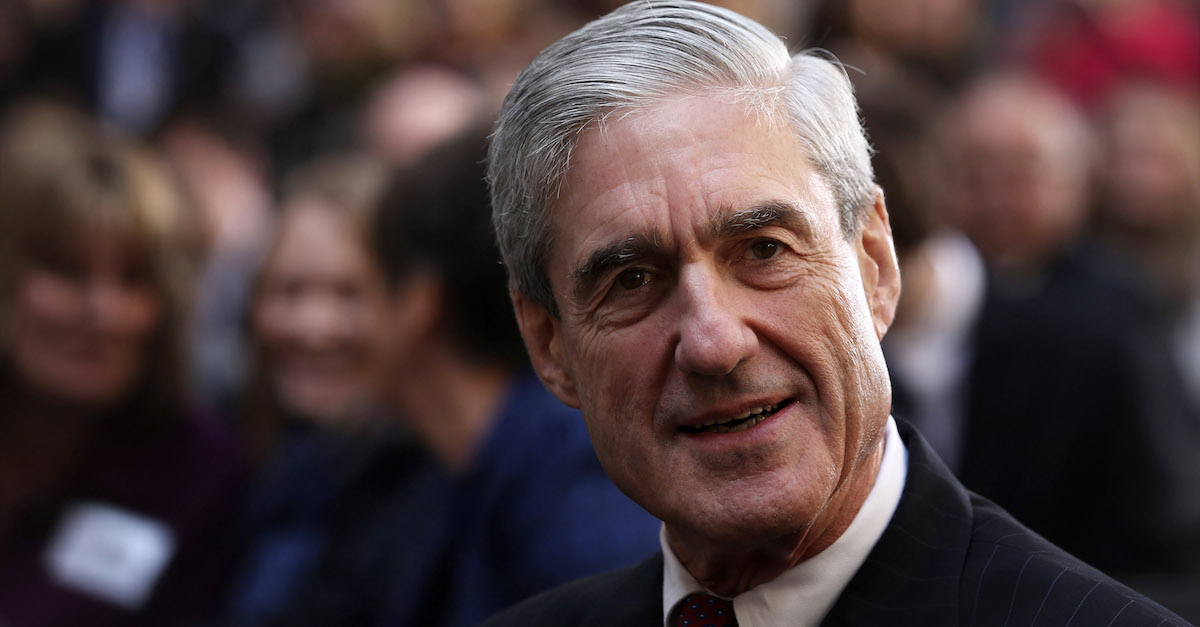
President Donald Trump‘s lawyers are gearing up for special counsel Robert Mueller‘s final report, and they apparently expect that a “complex multi-faceted” legal fight over executive privilege will be required.
Trump attorney Rudy Giuliani told the Daily Beast that he’s still in wait-and-see mode, while an unnamed person familiar with the legal team’s thinking expressed that Team Trump “expect[s] a complex, multi-faceted process to ensue after Mueller’s team drops its report—potentially involving a legal battle over executive privilege.”
Giuliani, for his part, said that if Mueller’s report “doesn’t deal with sensitive, privileged material, then we probably will have no objection.”
“But we can’t know that until we see it, and we can’t know if we’re going to agree to all of it, some of it—there’s no way to know that in the abstract,” he added, predicting there could be “selective problems” with the report.
The key takeaway here, really, is that once again the specter of executive privilege has been raised. Here is a neat summary of what executive privilege is and why it would be invoked:
It’s the idea that a president has a right to withhold information from Congress or the courts. The White House says that’s important to protect internal deliberations on important issues. Intended to help get the president some good and candid advice, President Dwight Eisenhower came up with the phrase. Since then, lots of presidents from both political parties have used it to try to shield conversations and documents on sensitive subjects.
In short, Trump’s lawyers claim they expect to fight over what details in the Mueller report should and should not be made available to the public for viewing, but there are a couple of ways this strategy may backfire.
Consider that Speaker of the House-designate Nancy Pelosi (D-Calif.) has hired veteran Department of Justice lawyer Douglas Letter to serve as general counsel of the House of Representatives in 2019. He’s expected to be a force for executing the House Democratic majority’s subpoena efforts and more in the new year.
Letter previously criticized Giuliani in no uncertain terms on the subject of executive privilege.
Letter argued that Giuliani has been trotting out a “red herring” by asserting executive privilege as “a way to bury at least parts of Special Counsel Robert Mueller’s much-anticipated report at the end of his investigation.”
“It’s time to focus on where the real threat to Mueller’s report reaching the public may arise,” he said. “The assertion of executive privilege is not it.”
Letter then slammed Giuliani for misleading the American people with a “potentially dangerous distraction” by encouraging the public and pundits to debate about this “red herring”:
In the final analysis, talk of executive privilege in this context is a distraction. It suggests that experts should be debating the legal basis on which Trump might try to bury Mueller’s report. But the President’s power, properly understood, means that executive privilege is a red herring at this point, and, indeed, a potentially dangerous distraction insofar as it pushes our public discourse toward debating the relevance and legality of the privilege’s assertion. Whether Mueller’s report is hidden from the public is, simply put, a choice for the President to make. It’s the type of choice for which the American public is entitled to hold the President responsible. And, if the President makes the dangerous and foolish decision to keep Mueller’s work from the American people, outrage should be directed not at legal doctrines involving executive privilege, but at a President who will have made a most regrettable decision.
In reality, Letter said, the issue at hand regarding Mueller’s report boils down to whether Trump himself will “exercise the authority he possesses to intervene and stop the American people from seeing Mueller’s critical conclusions.” In other words, Trump has the power to bury the Mueller report, and executive privilege doesn’t really have anything to do with that.
Why strategize around a “red herring,” then? Letter suggested that Giuliani is purposely going down the path of a privilege fight to provide a legal justification for burying the report that would distract from the act itself. Attempting to bury a report on grounds of privilege would, regardless, result in tremendous political pushback, and in that sense could be seen as backfiring strategy. Though, granted, there do not appear to be a lot of alternatives.
Here’s another way of looking at the problems an executive privilege fight would pose. Lawfare editor-in-chief Benjamin Wittes argued that this would basically accomplish the opposite of what is intended. Wittes said let’s assume that executive privilege claims are valid — although that is a “heck of an assumption.” He pointed out that executive privilege “covers only information involving communications between the president and his staff” and “does not cover conclusions.”
In practice, a mangled report of this kind would serve to “squelch […] certain information of the report, but not its conclusions–and not all of the evidence.” With that in mind, Wittes said, “imagine now a Mueller report coming with the conclusions intact, some evidence visible, and presidential communications all redacted.”
https://twitter.com/benjaminwittes/status/1080120313327816704
https://twitter.com/benjaminwittes/status/1080120324765728768
https://twitter.com/benjaminwittes/status/1080120335247261697
https://twitter.com/benjaminwittes/status/1080120342524452864
What effect would this have on Team Trump? Wittes said that you would see a “release of Mueller’s conclusions in a fashion that would be essentially impossible to rebut or address,” as “the president’s lawyers would be largely unable to discuss the president’s conduct or any communications that might be contained in those redactions for fear of waiving the privilege.”
What’s more, Trump and Giuliani would be left to argue “there was no evidence to support [Mueller’s] conclusion” while also saying that “this evidence, about which you know, would be insufficient if you could see it, which you can’t because I won’t let you […] so trust me I’m innocent.”
“It’s not going to fly,” Wittes concluded.
[Image via Alex Wong/Getty Images]